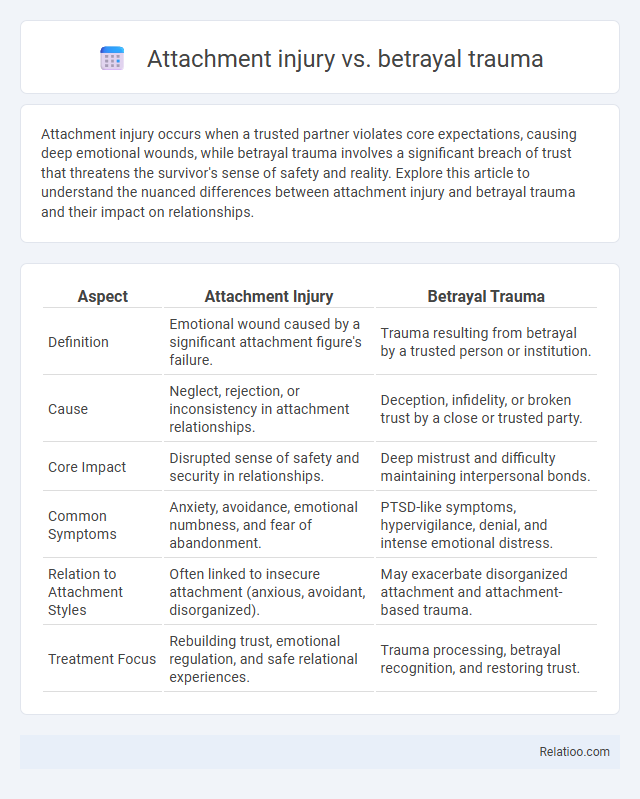Attachment injury occurs when a trusted partner violates core expectations, causing deep emotional wounds, while betrayal trauma involves a significant breach of trust that threatens the survivor's sense of safety and reality. Explore this article to understand the nuanced differences between attachment injury and betrayal trauma and their impact on relationships.
Table of Comparison
| Aspect | Attachment Injury | Betrayal Trauma |
|---|---|---|
| Definition | Emotional wound caused by a significant attachment figure's failure. | Trauma resulting from betrayal by a trusted person or institution. |
| Cause | Neglect, rejection, or inconsistency in attachment relationships. | Deception, infidelity, or broken trust by a close or trusted party. |
| Core Impact | Disrupted sense of safety and security in relationships. | Deep mistrust and difficulty maintaining interpersonal bonds. |
| Common Symptoms | Anxiety, avoidance, emotional numbness, and fear of abandonment. | PTSD-like symptoms, hypervigilance, denial, and intense emotional distress. |
| Relation to Attachment Styles | Often linked to insecure attachment (anxious, avoidant, disorganized). | May exacerbate disorganized attachment and attachment-based trauma. |
| Treatment Focus | Rebuilding trust, emotional regulation, and safe relational experiences. | Trauma processing, betrayal recognition, and restoring trust. |
Understanding Attachment Injury: Definition and Origins
Attachment injury refers to damage in close relationships caused by perceived breaches of trust or emotional neglect, often originating in early developmental stages or significant relational episodes. Betrayal trauma specifically involves violations of trust within attachment bonds, emphasizing the impact of betrayal by a trusted caregiver or partner, leading to profound psychological distress. Understanding attachment injury requires examining how relational wounds disrupt emotional security and attachment patterns, influencing long-term mental health and interpersonal functioning.
Defining Betrayal Trauma: Core Concepts
Betrayal trauma occurs when a trusted person's harmful actions violate the essential bond of trust, deeply impacting emotional security and attachment. Unlike general attachment injuries, which involve disruptions in emotional bonds, betrayal trauma specifically involves breaches of trust that challenge your ability to perceive safety and predictability in relationships. Core concepts include secret-keeping, cognitive dissonance, and efforts to maintain relationships despite profound feelings of betrayal.
Key Differences Between Attachment Injury and Betrayal Trauma
Attachment injury involves a rupture in trust caused by a loved one's actions that lead to deep emotional pain, while betrayal trauma specifically refers to harm inflicted by someone trusted, often violating core relational expectations. The key difference lies in the scope: attachment injury centers on emotional wounds within close relationships, whereas betrayal trauma highlights the violation of trust that disrupts fundamental attachment security. Understanding these distinctions helps you address and heal the unique effects each trauma imposes on your emotional well-being.
Common Causes of Attachment Injury in Relationships
Common causes of attachment injury in relationships include breaches of trust, such as infidelity, abandonment, and emotional neglect, which undermine the secure bond between partners. Betrayal trauma specifically arises when a trusted partner violates this trust, leading to severe emotional harm and difficulties in attachment repair. Understanding these dynamics is crucial for addressing the deep emotional wounds that compromise relationship stability and attachment security.
How Betrayal Trauma Manifests in Interpersonal Dynamics
Betrayal trauma manifests in interpersonal dynamics through heightened distrust, emotional withdrawal, and difficulty forming secure attachments, often stemming from violations by trusted individuals. Unlike general attachment injury, which results from any disruption in emotional bonds, betrayal trauma specifically involves betrayal by a caregiver or close partner, intensifying feelings of confusion and vulnerability. This unique form of trauma disrupts relational patterns, leading to challenges in communication, intimacy, and emotional regulation within relationships.
Emotional and Psychological Effects of Attachment Injuries
Attachment injuries result in deep emotional wounds that disrupt your ability to trust and feel secure in relationships, often causing anxiety, depression, and difficulty forming healthy connections. Betrayal trauma, a specific type of attachment injury, uniquely impacts psychological well-being by inducing intense feelings of betrayal, confusion, and fragmented self-identity due to a breach of trust from a primary caregiver or close attachment figure. The emotional and psychological effects of these injuries often manifest as chronic stress, impaired emotional regulation, and difficulties in attachment styles, which profoundly affect interpersonal dynamics and mental health.
Impact of Betrayal Trauma on Trust and Security
Betrayal trauma profoundly disrupts Your ability to trust by shattering foundational beliefs in safety and reliability within close relationships. Unlike general attachment injuries, betrayal trauma involves a significant violation of trust by a caregiver or loved one, intensifying feelings of insecurity and emotional instability. This trauma can lead to chronic difficulties in forming secure attachments, impairing emotional regulation and interpersonal connection.
Healing Pathways: Addressing Attachment Injury
Healing pathways for attachment injury focus on repairing ruptured emotional bonds through therapeutic interventions such as emotionally focused therapy (EFT) and trauma-informed care. Betrayal trauma emphasizes rebuilding trust and safety by validating the survivor's experience and fostering secure attachment patterns. Addressing attachment injury requires integrating trauma resolution techniques with attachment-based therapies to restore relational stability and emotional regulation.
Therapeutic Approaches for Betrayal Trauma Recovery
Therapeutic approaches for betrayal trauma recovery focus on rebuilding trust, processing complex emotions, and restoring a secure attachment framework disrupted by betrayal. Evidence-based treatments such as trauma-focused cognitive behavioral therapy (TF-CBT), eye movement desensitization and reprocessing (EMDR), and attachment-based therapy target both emotional regulation and relational repair. Your recovery benefits from tailored interventions that address the unique impact of betrayal trauma compared to general attachment injuries, emphasizing the restoration of safety and emotional connection.
Building Resilience After Attachment Injury and Betrayal Trauma
Building resilience after attachment injury and betrayal trauma involves understanding the deep emotional wounds caused by disrupted trust and security in relationships. Your healing process benefits from therapy techniques like trauma-informed care and attachment-based therapy, which help restore emotional safety and foster secure connections. Integrating mindfulness practices and developing healthy boundaries strengthen your capacity to recover and build long-term psychological resilience.

Infographic: Attachment injury vs betrayal trauma
 relatioo.com
relatioo.com